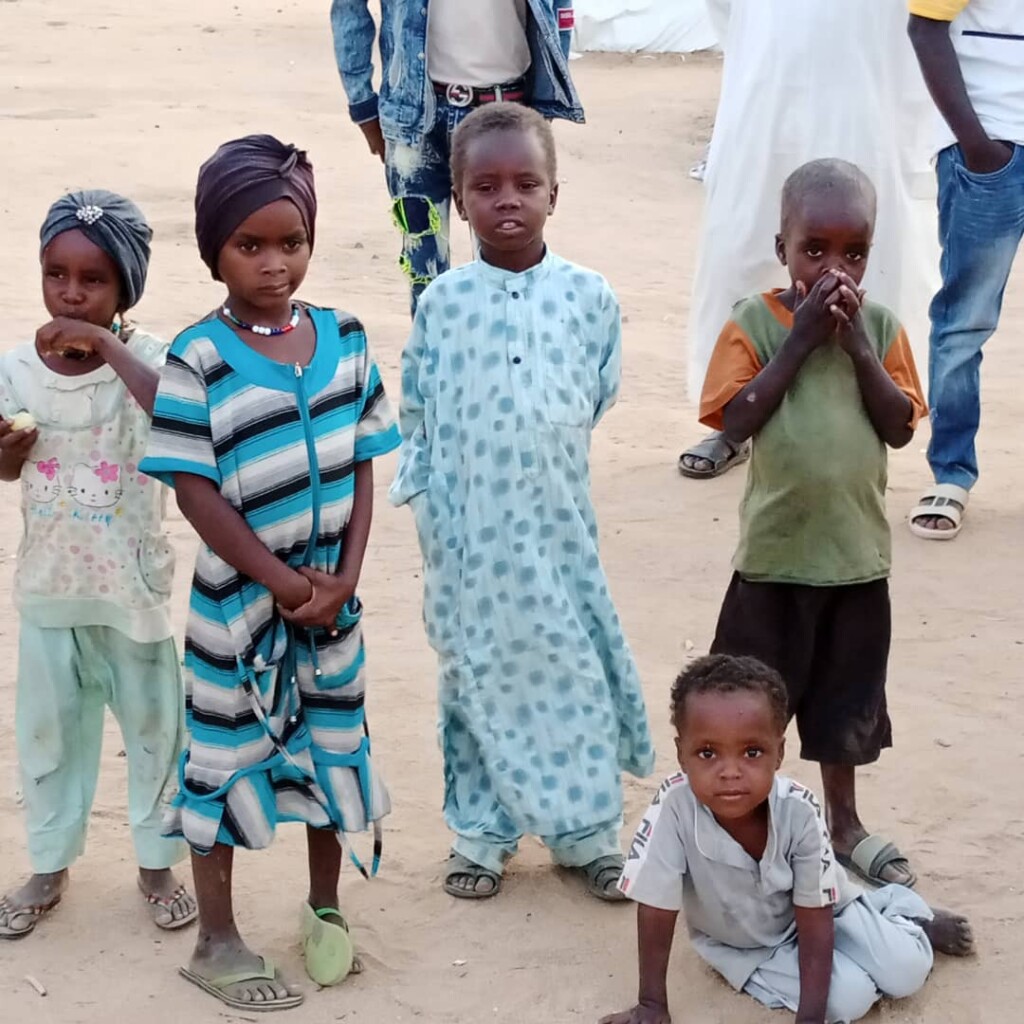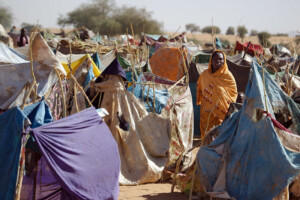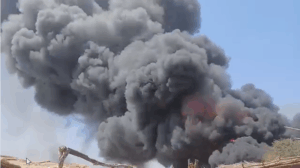USA and UN ‘deeply troubled’ by battles for North and West Darfur capitals

Refugee children from Darfur in the Iridimi camp in eastern Chad (Photo: RD)
The UN humanitarian coordinator for Sudan and US Secretary of State have expressed their serious concern about ‘an imminent large-scale attack’ by the Rapid Support Forces (RSF) on El Fasher, capital of North Darfur. The RSF also seeks to take control of the army base in El Geneina, West Darfur. Listeners reported a ‘cautious calm’ from the capitals of South and Central Darfur, which came recently under control by the RSF.
Antonov warplanes of the Sudanese air force launched airstrikes on RSF sites in El Fasher yesterday morning. Several homes were destroyed by the bombardments. Sounds of ground-based missiles were heard throughout the city.
The northern and eastern neighbourhoods of El Fasher witnessed a large exodus of people, El Fasher resident Mohamed El Hadi reported. “Many sought refuge in southern El Fasher, but I also saw lorries carrying people to Mellit north of El Fasher, and Ed Daein, capital of East Darfur.”
The city’s markets continued to be closed for a second day, while public transport was limited to a few vehicles.
El Fasher hosts many people who fled the fighting in Nyala since the SAF-RSF war erupted in Khartoum in mid-April. “The conditions in the various shelters for displaced people in El Fasher deteriorated over the past two days because the markets are closed and the displaced are unable to obtain food and other essential goods,” El Hadi explained.
El Moez Adam of the Hajj Abdelsalam Diabetes Centre in El Fasher told Radio Dabanga that the Mellit gate was hit by an Antonov yesterday morning, “which led to large panic among the residents of the area”.
He added that most of the staff who work at the centre fled the city.
Another source reported the rape of a girl in El Fasher’s Deim Selek neighbourhood by a group of gunmen on Wednesday.
The girl was beaten and raped, while her relatives in vain tried to seek help in the neighbourhood, as most of the residents of Deim Selek fled their homes.
Appeal
US Secretary of State Antony Blinken said in a press statement yesterday that his country “is deeply troubled by reports of an imminent large-scale attack” by the RSF on El Fasher “that would subject civilians, including hundreds of thousands of displaced persons – many of whom only recently fled to El Fasher from other areas – to extreme danger.
“Credible reports indicate that both the RSF and the Sudanese Armed Forces (SAF) have failed to take necessary measures to prevent civilian casualties in residential neighborhoods of El Fasher.
“The United States calls on the warring parties to immediately cease further attacks in and around El Fasher to uphold their obligations under international humanitarian law concerning civilians as reaffirmed in the May 11 Jeddah Declaration of Commitment to Protect the Civilians of Sudan. We echo Governor Nimr Abdulrahman’s appeal to the warring parties to allow civilians to safely move to more secure areas.”
‘Territorial control’
After the RSF managed to take control of Nyala last week and Zalingei this Tuesday, their focus lies now on the three other Darfur state capitals, El Fasher, El Geneina, and Ed Daein, reportedly to expand their territorial control and thereby enhancing their negotiation leverage in the Jeddah talks.
Abdelrahim Dagalo, RSF deputy commander and brother of RSF Commander ‘Hemedti, announced “more operations in all Darfur states”.
In a speech to his troops from within the 21st Infantry Division base in Zalingei yesterday, he said that RSF front units had moved towards Nierteti in Central Darfur, El Geneina in West Darfur, and El Daein, the capital of East Darfur where no fighting has been reported since the war erupted on April 15.
The RSF later announced their control of the SAF base in Nierteti.
West Darfur
Artillery shelling in El Geneina continued throughout Wednesday night and yesterday morning.
The fate of the 15th SAF Division in the city was shrouded in uncertainty after the deadline set by the RSF to the army to hand over the garrison, listeners reported from the already devastated West Darfur capital.
People still living in neighbourhoods adjacent to the SAF garrison, fled to other parts of the city and across the border to eastern Chad. Sources also spoke about initiatives by community leaders to stop the fighting.
RSF paramilitaries published videos on social media about their control of El Geneina airport and the command of the 15th Division, but the authenticity of the footage has not been independently verified so far.
Refugees in the nearby Chadian town of Adré yesterday reported the arrival of large numbers of people from El Geneina and Ardamata.
Central Darfur
The Central Darfur capital seized by the RSF on Tuesday witnessed “a cautious calm” following the cessation of shelling and gunshots in the city.
Displaced community leader Sheikh Abdelrazig Yousef told Radio Dabanga that the security situation in the nearby Hasaheisa camp also improved, after having been besieged by the RSF for weeks.
A committee of displaced people met with the Ali Yagoub, RSF commander in Central Darfur, demanding more coordination to provide more security and protect the current agricultural season by allowing residents of the camp to harvest the crops.
Yousef added that the displaced living in Hasaheisa camp are in dire need of aid. “We now launched a large campaign to help out the poorest in Hasaheisa,” he said, and appealed on the international community to provide humanitarian assistance.
Another source reported that the Zalingei Grand Market remained closed. “There are a few street vendors only.” He pointed to the partial opening of markets in the Hamidiya and Khamsa Dagayeg camps for the displaced, and the limited traffic on the city’s roads. “The power and water supplies have been cut off for months. The Zalingei Teaching Hospital is not functioning.”
South Darfur
Mahmoud Abdelaziz, director of the Nyala University Training and Capacity Building Centre, yesterday reported “a significant improvement in terms of security in Nyala after the artillery shooting and aerial bombardments stopped”.
He told Radio Dabanga that the people in most of neighbourhoods of the South Darfur capital are able to freely move around again. “The El Jir and El Nahda neighbourhoods are still insecure.”
The water and electricity provision has not returned yet, after lines were destroyed in the battles last week, he said, and noted that engineers are working to restore the Zain and Sudani communication networks. “We expect their return in the coming days.”
Abdelaziz also complained about “the large presence of militant tribesmen in Nyala. “The traders of the Grand Market and the Popular Market do not dare to open their shops and stalls for fear of plundering or a return of the fighting.”
About 5,000 people who fled the fierce fighting in Nyala and sought refuge in neighbouring Beleil were accommodated in schools and public facilities in the locality month ago, where they have been suffering from the scarcity of water, food, medicine, and health care since their arrival.
Journalist Habib Juma reported from Beleil that “there is only one health organisation working here.”
‘Toll on civilians’
The Deputy Special Representative of the UN Secretary-General for Sudan, officer-in-charge of UNITAMS, Resident Coordinator, and Humanitarian Coordinator Clementine Nkweta-Salami, expressed her deep concern about the military escalation in Darfur in a statement issued by the UN Integrated Transition Assistance Mission in Sudan (UNITAMS) yesterday.
“I am alarmed by reports that civilians are being caught in the ongoing fighting between the SAF and the RSF in Darfur, in a context of heightened intercommunal tensions, recalling the events in El Geneina in Darfur last June”, she stated.
“At a time when so much hope is being placed on the Jeddah talks to achieve a sustainable ceasefire and facilitated humanitarian access, I call on all parties to refrain from escalating and expanding the conflict. The toll this conflict is taking on civilians is unimaginable. Fighting needs to stop and parties to the conflict need to ensure the safe passage of humanitarian assistance to the millions of people in Sudan who desperately need it”.











 and then
and then